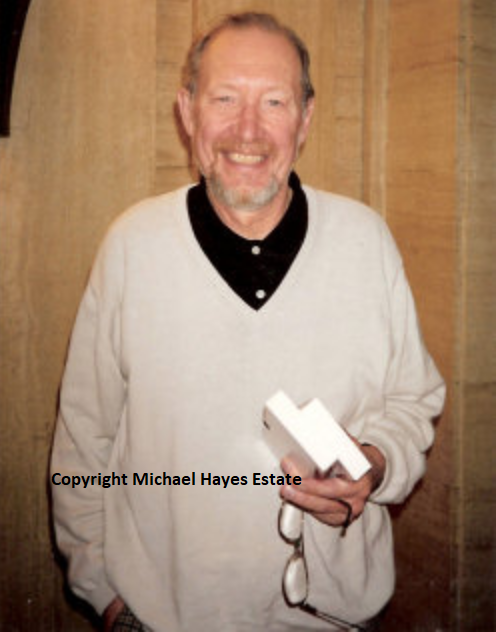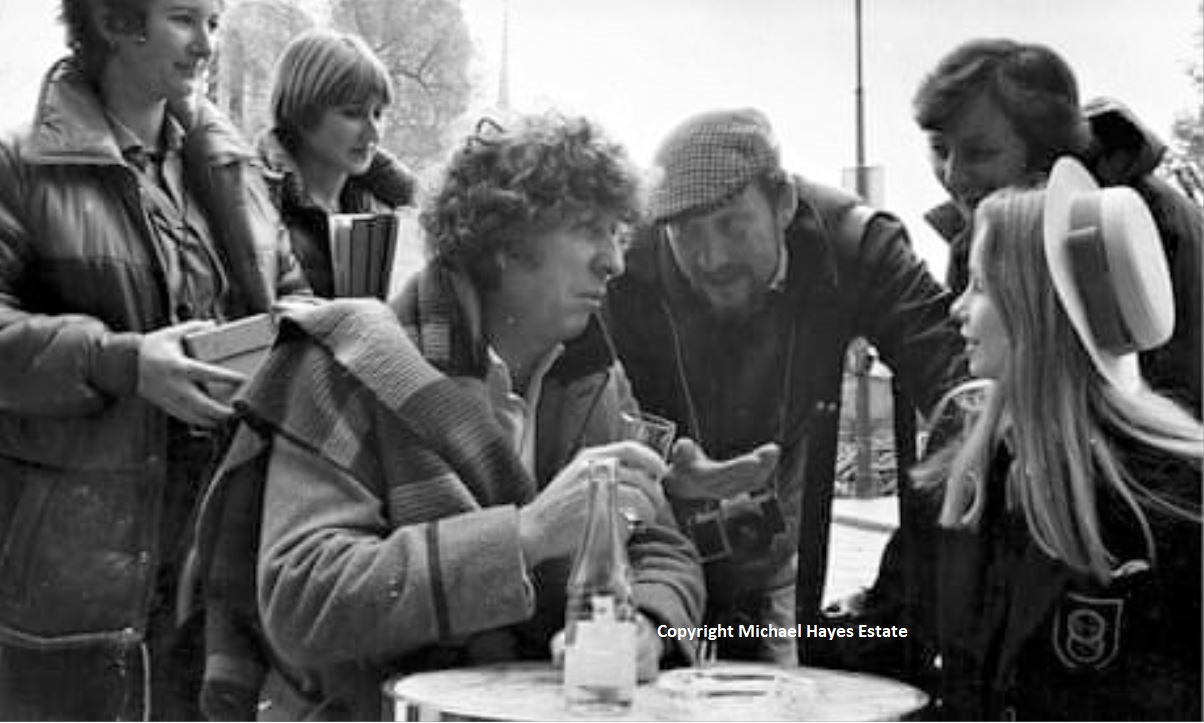Michael Hayes (1929-2014)

Introduction by Patrick Hayes
My father, Michael Hayes, the television director and producer, and former Shakespearean actor, who died aged 85, was best known for directing 14 episodes of Doctor Who (with Tom Baker, 1978-79), An Age of Kings (1960) and The Promise (1969). He gave Julie Christie her screen debut in the seminal science-fiction serial A for Andromeda (1961), directing all seven episodes. His directorial work also included episodes of Z-Cars, Maigret, Sherlock Holmes, Take Three Girls, The Troubleshooters, The Onedin Line, When the Boat Comes In and All Creatures Great and Small.

Michael with Tom Baker and Lalla Ward during the filming of Doctor
Who in Paris during April & May 1979
Michael was born in Barking, Essex, son of Thomas Hayes, a civil
servant, and his wife, Alice (nee Tindale), who died when Michael
was two. He was evacuated to Yorkshire in 1940, and was educated at
Harrogate grammar school. In 1944, aged 15, Michael was "discovered"
by the playwright Falkland Cary and given a principal role in Cary's
play Burning Gold, at the Royal Hall theatre, Harrogate. He told
Cary of his intention to pursue a theatrical career, and
subsequently achieved his ambition by becoming a member of the Royal
Shakespeare Company.
He met and married the actor Mary Chester in 1955, and they had a daughter, Alisoun. This marriage ended in divorce after he met my mother, Jane Phillips, at the BBC in 1963. His BBC career had begun as a studio manager for the World Service, after which he transferred to television as a floor manager and assistant director.
In 1971 he moved our family lock, stock and barrel from Hampstead, north London, to a dilapidated Kent cottage he had found for renovation in a newspaper ad. Although he had no DIY skills (his friendly nickname when undertaking tasks of this nature was "Bodger Brother"), soon my sister, Kelly, and I had our own bedrooms, and the acres of open farmland where we walked our spaniel, Boz, quickly made up for the loss of our life in London. Michael adored the country life and was a keen horseman. He commuted from Elham to the BBC studios at Wood Lane and later Bush House in London.
I remember him accepting the Doctor Who assignment in 1978 with a lack of enthusiasm, but he soon abandoned these misgivings and afterwards counted the actor Tom Baker as one of his friends.Later, Dad's distinctive voice became familiar to radio listeners worldwide reading World Service news from 1986 to 1994 and I know he made many friends in the BBC newsroom at Bush House. It was during this time he recorded the series A Year In The Country.
His marriage to Jane ended amicably in 1980, and they remained great friends, swapping plant cuttings and Guardian articles until his death. He is survived by his three children, seven grandchildren and four great-grandchildren.
A Year In The Country Introduction by Derek Boughton
A Year in the Country,
was a series of short programmes broadcast on the BBC World
Service during 1992.
They were put together by Michael Hayes, who then lived in
Prospect Terrace, and they are centred on the Elham Valley, and
include a number of interviews with Elham residents, often conducted
in the public bar of the King’s Arms.
Michael had cut his
teeth in the theatre as a spear carrier with the Royal Shakespeare
Company, but most of his career was as producer or director.
Among his credits were Z Cars (a couple of episodes of this
Merseyside series were shot in Lyminge!) and Dr Who, during the Tom
Baker era. He
showed his versatility by producing The Magic Flute with Welsh
National Opera, in which Sir Thomas Allen as Papageno came on riding
Michael’s bicycle.
By 1992 he was doing a
regular night shift at the World Service, and was often my companion
in insomniac hours.
The programme reflected his broad range of his literary,
musical and sporting interests.
One night I noticed that he had misquoted from Andrew
Marvell’s The Garden,
which begins ‘How vainly men themselves amaze / To win the palm, the
oak or bays’, and managed to get a parody beginning
‘How vainly men themselves amaze / When listening in to
Michael Hayes’ pinned up in the King’s Arms before he got in for his
lunchtime pint.
You may be pleased that I cannot remember all of it, but one
couplet was ‘Telling us his latest trouble / How he missed a Guineas
double’, as Michael often spoke of his success, or lack of it, with
the bookies.
In
A Year in the Country it is not all Elham.
In September, after a ride in Kirk Vincent’s tractor (a
harrowing experience), he samples the 1991 Műller Thurgau at the Elham
Valley Vineyard, and spends time at the East Kent Ploughing Match,
perhaps not all on the same day.
The October edition is about hop-picking, based around a farm
at Boughton under Blean, and includes some good BBC archive
recordings from the 1930s.
I recognise the voices
of Vernon Blackford and Bert Want in the King’s Arms in January, and
can echo Bert’s recollections of delivering bread during the old
East Kent winters.
I was a Saturday boy on the Acrise/Swingfield/Denton round in 1956.
For three weeks running, the only way we could get out of the
Valley was via Folkestone, so the Freeman’s (Barbara Athow’s family)
at South Lodge missed out completely.
Trudging through the drifts to Mount’s Court with ten large
loaves on your back was hard going for a fifteen-year-old, but it
was an adventure too.
If the customers were at home, you could be awash with tea if
you accepted half their offers; if they were out, your money would
be on the kitchen table, alongside that for the butcher, and the man
from the Pru (Jim Law).
Members who have taken
the tour of Tappington Hall will know what a good piece of cake Sue
Clough provides.
Sixty-five years ago, Mrs Gibson presided over that welcoming
kitchen, and I still remember its warmth, and the delicious slice of
fruit cake she gave me at half-past-ten one night, before one of her
sons pulled us up to the main road with his tractor.
However late you got back to The Square, Mrs Cook would be
waiting at the kitchen table ready to count the takings.
I haven’t discovered in
which month my interview featured.
You may be surprised to know that it wasn’t in the King’s
Arms. Some weeks
later, when I was working behind the bar there, an ex-pat
couple said that they had heard me on the programme.
Of all places, they lived in Andorra, but Michael’s
affectionate portrait of life in our valley had been shared round
the world.
Links to "A Year In The Country"
**
[
January
[
July ] [
August
Click on the above links to hear the 15 minute
broadcasts
A Sense of Place
A Review of A Year In The Country by
Andrew Joynes
With the logs
piled high in the grate and the Christmas claret for company, Daphne
and I recently binge-listened to the radio series A Year in the
Country. And just as
hearing these evocative programmes again took Derek Boughton back to
the Elham Valley of thirty years ago - and even further back to his
childhood memories of the village and its surroundings – so I was
taken back to Bush House, the headquarters of BBC World Service,
where the series presenter Michael Hayes and I both worked in 1992.
When Michael was
combining his main job as a newsreader with crafting these delicate
radio features in one of the Bush House recording studios, I was
part of a management team overseeing an expansion of
English-language News and Current Affairs programmes in response to
the extraordinary events which had recently occurred on the world
stage. The Berlin Wall
had come down; the first Gulf War had been fought and won;
perestroika was under way in the Soviet Union.
There was a growing demand – throughout the world but
particularly in America - for permanent feeds of World Service
output which could be carried in good audio quality on public
service radio networks.
Faced by the hectic pressures of providing up to six hours of
‘rolling’ News and Current Affairs every day, my fellow managers and
I would not have had time to listen to carefully-produced features
like Michael’s A Year in the Country. One or two of the
harder-nosed members of the team might even have questioned the
relevance of such programmes for an international audience.
After all, they would argue, in the great scale of world
events, how can you compare the labours of the months in an English
valley to the ‘End of History’, as the West’s supposed victory in
the Cold War was unwisely described at the time?
I soon realised
however that such well-crafted programmes not only had a useful
place in the World Service schedules, but were an essential part of
a healthy broadcasting exchange between nations.
My epiphany came at a programme conference in San Francisco
in the early 1990s.
There a senior executive from America’s National Public Radio urged
her BBC counterparts to continue to schedule homely and distinctive
features about our nation’s way of life so as to redeem the
unrelenting juggernaut effect of rolling news.
‘Those programmes convey to us your sense of place,’ she
said. And she went on to explain that by ‘place’ she meant British
culture, in the broadest interpretation of the term.
Such feature programmes were clues, in other words, as to who
the British are as a people.
Those clues are
certainly to be found within a series like A Year in the Country.
Michael’s mellow baritone is like Shakespeare’s Chorus
summoning up images, as with his description of teams of shire
horses at a ploughing match and the thundering of hoofs at a
point-to-point (‘Think, when we talk of horses, that you see
them…’). He is a relaxed interviewer, at ease with East Kent
grandees like Bill Deedes and Valley farmers like our own dear
George Palmer.
Michael has a producer’s ear for a good sound effect (such as the
coughing bellow of a tiger at the Port Lympne menagerie) and a
journalist’s ability to change editorial direction swiftly. Listen
for instance to his moving actuality of the birth of a lamb in
March, and the deftness with which he moves on to debate the ethics
of hunting by asking whether foxes are a threat to lambs (and then –
on the principle that you never let a good sound effect go to waste!
- incorporating the sounds of the East Kent Hunt and attendant sabs
which he probably recorded on Boxing Day 1991).
These programmes
from thirty years ago do indeed give us a sense of place: our
place, the Elham Valley.
So pile the logs high, and re-fill the glass…